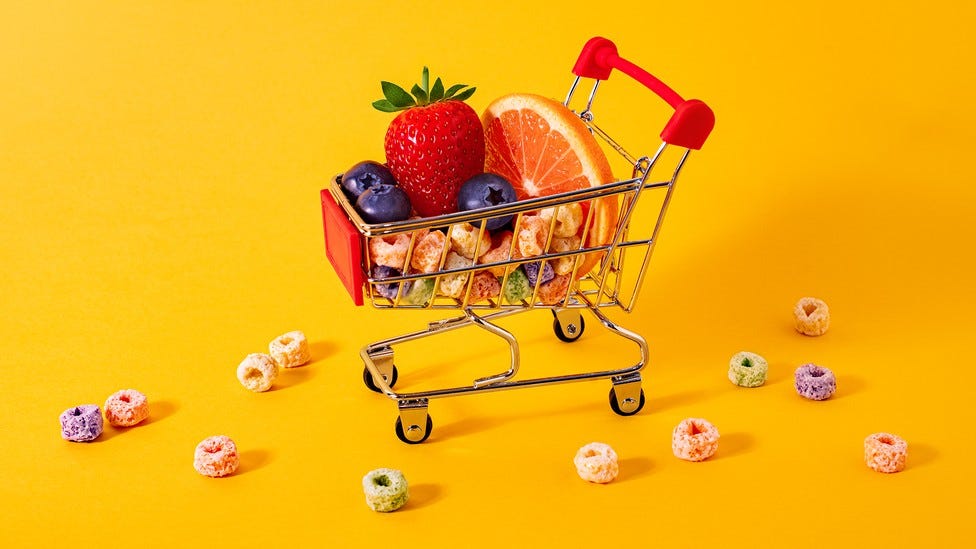Five Things: Hamas, Beer, Bankification, UPF, Deep-Sea Divers
It's Sunday. Read this now.
Hello and welcome back to Five Things!
This week I attended a memorial service for the victims of October 7 in Israel. It was a sad and beautiful service, which took place at the synagogue in Hamburg. For me, October 7 is a breakdown of civilization and I don’t understand why so many people in the West don’t see it that way. We cannot accept antisemitism here or abroad, regardless of it being state-sponsored or just creeping back into the public sphere. If we allow the intolerant to dictate our way of living, we are doomed. And I sure as hell want people to live in peace, regardless of their nationality, religion, sexual orientation, dietary preferences or whatever intolerant people are trying to use to divide us apart. It sickens me to see all the police in front of a synagogue in Germany. We don’t need police protection for churches or mosques. It pains me to see how people are trying to justify October 7 as a legitimate response to the founding of the state of Israel in 1948 and the continued existence of Jews in the region and elsewhere. There is no justification for what happened on October 7, ever. We need to fight the intolerant and we need to better educate people about antisemitism, before it is too late and the intolerant will destroy our democracy while claiming to fight for the common people.
Here are this Sunday’s Five Things - enjoy!
Hamas Is Not Done Fighting
As it did in the 1990s, Hamas will nod in agreement to the various cease-fire requirements but will also seek to continue functioning as a political actor in Gaza. It will recruit new leaders and fighters from recently released prisoners and Gazans frustrated by the slow pace of aid and reconstruction, rearm its cadres with weapons smuggled by Iran or manufactured at home, and refill its empty coffers by co-opting humanitarian aid or resources intended for reconstruction. Put simply, Hamas may play along with the first phase of the cease-fire. But the group is not done fighting.
While I am happy that the remaining living hostages were finally released, I am doubtful that the region will find lasting peace without destroying Hamas completely.
Is it last orders for German beer?
Falling sales, rising costs and generational change have created an existential crisis for German beer makers — and sales of the alcohol-free products that now comprise almost one-tenth of their output will not fully plug the gap. But exports are falling even faster than the intensifying domestic decline, leading the head of one major brewery to warn two months ago about a “landslide” that would sweep away both big and small firms. “The brewing world is crumbling,” says Stefan Blaschak, managing director of Oettinger, which is closing one of its four plants. It’s a huge dent in the self-image and confidence of the nation that powers the European economy — something which cannot be masked by all the beer-soaked revelry, drinking chants and sea of lederhosen at Oktoberfest.
I have to admit that I am part of the problem. I used to drink plenty of beer (and it showed) and now I rarely drink beer at all. I still like it, but I cut it down by a lot and mostly drink non-alcoholic beer, which tastes a lot like American beer. And now it is time for one of my favorite beer-related jokes: “American beer is like having sex in a canoe: fucking close to water.”
Everything Is Becoming a Bank
Bankification usually follows the same pattern: Once businesses dominate their market, monopolizing the heavy-industry sectors isn’t enough. Companies instead set their sights on acquiring the lifeblood of commerce: banking, where they can make money off of money by lending capital to be repaid with interest and collecting fees on financial transactions.
Instead of haggling with risk-averse bankers or courting new investors for financing, corporations could set up their own financial institutions to receive customer deposits, tap these pools of capital to fund their own projects at better rates, and cut off banking access to competitors that encroach on their market share or unions that meddle with the business.
This is an interesting take on one of the recent fintech buzzwords. It’s a bizarre business practice where companies make money not with their core products, but with unregulated banking.
Avoiding Ultra-Processed Foods Is Completely Unrealistic
Most nutritionists still agree that eating a bag of corn chips is far less healthy than eating an ear of corn. But some are now acknowledging that the “ultra-processed” category, which makes up about 60 percent of the American diet, has become too broad and difficult for many families to understand. “It’s insanity to me that bran flakes is in the same category as sweets,” Nicola Guess, a dietitian and researcher at the University of Oxford, told me. (Guess has consulted for companies that make plant-based meat alternatives—which are also ultra-processed foods.) Jimmy Chun Yu Louie, a dietitian at Swinburne University of Technology, in Australia, pointed out in a recent review paper that tofu is sometimes categorized as an ultra-processed food, despite being “a nutritionally rich protein central to many Asian cuisines for generations.” He concluded, “The evidence suggests that not all UPFs are inherently ‘bad.’”
I think we need new definitions about good and bad food, along with guides for navigation in an everchanging dietary landscape. Until then, I buy stuff at the farmers’ market and I also buy stuff where I don’t want to know much about the ingredients.
Stupidology
The truth panic had the unwelcome side effect of emboldening those it sought to oppose. “Fake” was one of Trump’s favorite slap-downs, especially to news outlets that reported unwelcome facts about him and his associates. A booming MAGA media further amplified the President’s lies and denials. The tools of liberal expertise appeared powerless to hold such brazen duplicity to account. A touchstone of the moment was Hannah Arendt, who observed in The Origins of Totalitarianism that “the ideal subject of totalitarian rule is not the convinced Nazi or the dedicated communist, but people for whom the distinction between fact and fiction . . . no longer exists.”
In 2025, the denunciations have a different flavor. To many of us, the central problem is that we live not so much in a time of lies, as one of stupidity.
Oh yes.
What It Feels Like to Risk Your Life as a Deep-Sea Diver on an Offshore Oil Rig
Only a few thousand people in America do all the subsea diving work. You have to be a jack-of-all-trades. About 90 to 95 percent of people that go to dive school don’t last a year in the industry. You’re working seven days a week, 12 hours a day, on a steel deck in the middle of the Gulf of Mexico. There are no long weekends off. You’re locked into it once you go offshore. You have to really love it to be able to push and laugh through the pain. And if you let it break you, you’re done.
When you’re out on the Gulf, you don’t even know what day it is. There are no windows inside your dive-support vessel. You might be woken up at two in the morning, or you might be woken up at two in the afternoon. The oil and gas industry wants someone in the water 24/7, no matter what time of year, even Christmas Day.
I once put on an old-fashioned diving helmet and talked to divers in the port of Hamburg, who explained what they are doing (and why they are using gear from the museum for it). That job sounded easy compared to what the divers at an offshore oil rig are doing. And that diving-helmet was just really heavy and not comfortable at all.
That’s it. Have a great Sunday! If you missed last Sunday’s edition of Five Things, have a look here:
— Nico









